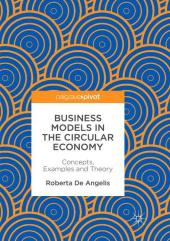 Neuerscheinungen 2019Stand: 2020-02-01 |
Schnellsuche
ISBN/Stichwort/Autor
|
Herderstraße 10
10625 Berlin
Tel.: 030 315 714 16
Fax 030 315 714 14
info@buchspektrum.de |

Roberta De Angelis
Business Models in the Circular Economy
Concepts, Examples and Theory
Softcover reprint of the original 1st ed. 2018. 2019. xix, 112 S. 2 SW-Abb. 210 mm
Verlag/Jahr: SPRINGER, BERLIN; SPRINGER INTERNATIONAL PUBLISHING 2019
ISBN: 3-319-89286-X (331989286X)
Neue ISBN: 978-3-319-89286-3 (9783319892863)
Preis und Lieferzeit: Bitte klicken
This book focuses on the role of corporations in the transition towards an economy that works more in line with ecological limits. It is centred on business model innovation in the context of the circular economy, which is gaining consensus across business, policy and academic circles by proposing more resource efficient industrial processes. Interest in circular business models is growing within academic and practitioner literature yet the concept is not clearly understood, with potential negative consequences for theory building and practical implementation. Therefore, this book conceptualises circular business models and investigates their theoretical foundations in relation to the rationale for adopting them, drawing on circular economy, business model, strategic management and neo-institutional literature and secondary data.
Chapter 1 Introduction 1.1 Book Aims 1.2 Book Structure
Chapter 2 Sustainable Development, Corporate Environmental Sustainability and the Circular Economy 2.1 Introduction 2.2 Sustainable Development and Corporate Sustainability: An Assessment 2.3 The Circular Economy: Context, Principles, Limitations and Relationships 2.4 The Circular Economy: Originators 2.5 Chapter Two: Summary
Chapter 3 Business Models and Circular Business Models 3.1 Introduction 3.2 Business Models 3.3 Circular Business Models: State-of-the-Art in the Current Literature 3.4 Circular Business Models: Towards a Conceptualisation 3.5 Chapter Three Summary
Chapter 4 Circular Business Models: Some Theoretical Insights 4.1 Introduction 4.2 The Theoretical Foundations of Circular Business Models 4.3 The Natural Resource-Based View of the Firm 4.4 Institutions and Neo-Institutional Theory 4.5 The UK´s Circular Economy Field 4.6 Chapter Four Summary
Chapter 5 Concluding Remarks 5.1 Research Contribution 5.2 Implications for Practitioners and Research Limitations 5.3 A Final Reflection
Index
Roberta De Angelis is a post-doctoral research fellow at the University of Exeter, UK. She holds a PhD in Management Studies and is Associate Fellow of the Higher Education Academy.


